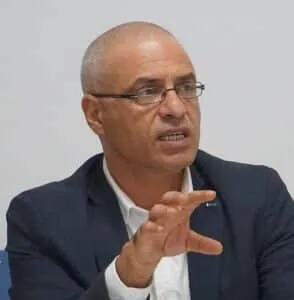A two-state solution may seem like a distant dream. Here’s why it shouldn’t be
From the river to the sea, Palestine and Israel must be free, secure — and separate

Palestinian Muslims perform an evening prayer known as ‘Tarawih’ outside Jerusalem’s al-Aqsa Mosque compound on March 11. Photo by Ahmad Gharabli/AFP/Getty Images
As hostilities expand beyond the borders of the Gaza strip and West Bank, and as the agonies of an age-old conflict continue to inflict misery on both peoples, it is imperative for Palestinians and Israelis to speak up and promote the only viable solution to this conflict: two states existing side by side, in peace, security and prosperity.
I know this sounds like an old political slogan, undermined by never-ending violence, hate and the perception — fed by extremists — that this conflict is intractable to the point of no return.
But after the painful anniversary of Oct. 7, with its heinous attacks against Israel, and the subsequent terrible war, which continues to destroy civilian lives on the Gaza side of the border, the time has never been better to remind all those who care for both Israelis and Palestinians that the only peaceful resolution to this conflict will be one that involves two states.

The dream of Israel as a Jewish and democratic state can only come about through the creation of Palestine, a homeland where Palestinians can exercise their inalienable right to self-determination.
As a Palestinian who lives in Ramallah, I understand that advocates of the two-state solution face a considerable challenge of leadership.
Israelis who wish to live in peace and security need a leadership that genuinely believes this conflict is a political and territorial one; it seems clear that the government of Prime Minister Benjamin Netanyahu sees it as an ideological one, an altogether more difficult thing to resolve. Only through negotiations to end the Israeli military presence in Gaza and Israel’s occupation of the West Bank can there be genuine strategic cooperation, coordination and security for Israel as a Jewish and democratic state.
On the other hand, Palestinians wishing to live in peace, prosperity and security must neutralize forces that call for the elimination of the neighboring Israeli state, and work toward the de-radicalization of the society as a whole.
In today’s war, and over the past three decades, dark forces of extremism on both sides have taken over. While mainstream forces have made many mistakes in the past in trying to achieve a negotiated solution, they must keep trying. The alternative is one in which extremists on both sides stick to irreconcilable religious dogmas and mangle theological texts to justify the conflict.
Proponents of the never-ending conflict have so far succeeded in creating a bleak outlook for the future. The patrons of this approach insist that only force, force and more force will bring about security, prosperity and peace for their side. This argument has never withstood the test of reality. The Israeli-Palestinian conflict, taken over by extremists, has only managed to lead the Israeli and Palestinian people into pain and agony, and vicious cycles of violence.
Israeli military superiority, while effective against foreign armies, is limited in stifling Palestinian national aspirations. Only political solutions can tackle this type of “threat” to the state of Israel. In fact, a peaceful resolution to the question of Palestinian national aspirations in building their own homeland is what will guarantee Israel’s future as a thriving, democratic Jewish state.
The creation of the state of Palestine would enable the Palestinian people to live in dignity, freedom and independence. From an Israeli perspective, the “demographic threat” that would eliminate the Jewish nature and character of Israel will certainly be mitigated if not totally eliminated.
As for security threats, the creation of a Palestinian state that is part of a regional and international Palestinian and Israeli agreement and that will return Palestinian refugees from the diaspora to their new homeland will ensure Israeli integration through real normalization with the people, and not just regimes, in the region.
Needless to say, many details of such an agreement need to be negotiated before implementation. International and regional partnership to contribute to a process of de-occupation and the pursuit of a new peaceful reality all sound like wishful thinking during these dark times. One thing is certain, however, while violence is raging and guns are roaring: Each and every individual who cares about the peoples of Israel and Palestine must pursue negotiations and diplomacy as the only viable path to peace and security in our region.
















